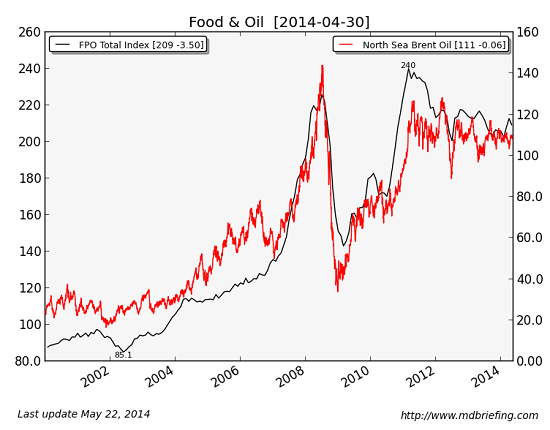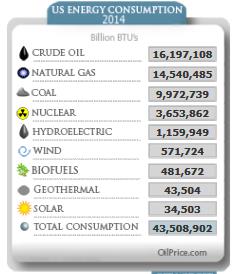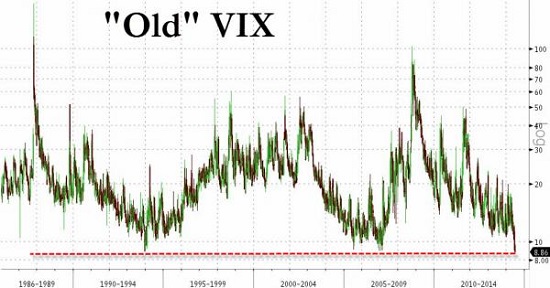Page added on July 1, 2014
The Next Global Meltdown Is Baked In: Connecting The Dots Between Oil, Debt, Interest Rates And Risk

The bottom line is the Fed can only keep the machine duct-taped together by suppressing the market’s pricing of risk.
One of the Grand Narratives of our era is the substitution of debt for income: as earned income and disposable income have stagnated for 40 years, the gap between the rising cost of living and stagnant household income has been filled by borrowed money.
Money has been borrowed to replace income everywhere: consumers have borrowed money to buy things they otherwise couldn’t afford, students have borrowed over $1 trillion to attend college, governments have borrowed money to fund wars and social spending, corporations have borrowed money to buy back their own shares, pushing stock prices higher.
There’s one little problem with debt: interest must be paid on debt. Let’s focus for a second on the difference between cash income and borrowing money. Cash doesn’t cost money to maintain; debt does. In a functioning economy (as opposed to the dysfunctional mess we have now), cash would earn income from interest paid by borrowers.
If cash income is saved, the cash can buy stuff without debt or interest payments. That is a powerful advantage over debt.
How powerful is the advantage of cash over debt? It’s literally life-changing. Take a look at your credit card statements, which now include an estimate of interest you will pay and how long it will take to pay off the balance at a given monthly payment.
Those making minimal payments will end up paying 100% or more of the balance due in interest.
The phenomenally high accrued costs of interest is true of mortgages, student loans, auto loans, corporate debt and government debt: eventually, current spending is crimped as more and more net income is devoted to paying interest.
There are two words for what happens when real income declines and interest payments rise: impoverishment and insolvency. This dynamic is scale-invariant, meaning it works the same for individuals, households, enterprises and governments.
Let’s connect the rising cost of oil to debt. As we all know, oil matters because it’s the foundation of our economy, and the cost of oil is built into virtually every sector in some way. For example, look at how the the cost of food rises and declines in lockstep with the cost of oil:

Despite the substitution of cheaper natural gas for oil, we use a lot of oil.

While the recent increase of 3+ million barrels a day in domestic production is welcome on many fronts (more jobs, more money kept at home, reduced dependence on foreign suppliers, etc.), the U.S. still needs to import crude oil.
U.S. Imports by Country of Origin (U.S. Energy Information Administration)
The rising cost of oil acts as an economy-wide tax. Everything that uses oil in its production or transport rises in price without offering consumers any more value than it did at much lower prices.
Look at the impact on food prices as oil rose from $20/barrel in 2002 to $140/barrel in 2008. While government statisticians adjust the consumer price index (CPI) based on hedonics (as the quality of things goes up, the price is adjusted accordingly) and substitution (people buy chicken instead of steak, etc.), the reality is, as one heckler put it, “We don’t eat iPads:” that is, all the stuff that is hedonically adjusted (tech goodies, etc.) is non-essential.
The Status Quo has compensated for the relentless rise in the systemic oil “tax” by making debt cheaper to service. The Federal Reserve’s zero-interest rate policy (ZIRP) has two purposes:
1. Channel immense sums of free money to the too big to fail banks by relieving them of the onerous requirement of paying interest on deposits while giving them unlimited access to nearly-free money they can lend out at huge spreads. (This is crony-capitalism writ large. The winners were picked by the Fed and the rest of us are the losers. Yea for the godlike Fed, our modern-day Mammon.)
2. To keep consumption alive as income declined and the oil tax eroded household disposable income, the Fed made borrowing cheaper.
Unfortunately for the godlike deities residing in the Fed, zero-interest rates trigger malinvestments, which are inherently risky. When unqualified borrowers borrow a ton of money–for example, a student with no assets or income, or a poor credit risk household assumes an FHA mortgage, or a corporation sells junk-rated bonds– the risk of default is intrinsically higher than debt taken on by qualified borrowers.
This poses a systemic problem for the Fed: The Fed needs to enable more borrowing by the uncreditworthy to keep consumption growing and bank profits flowing, yet the inevitable result of such credit expansion is a massive expansion of systemic risk.
The more debt that is taken on by marginal borrowers–where marginal is defined as unable to weather any shock or decline to their financial position or income–the more risk piles up in the system.
The analogy is a forest where the deadwood is never allowed to burn: The Yellowstone Analogy and The Crisis of Neoliberal Capitalism (May 18, 2009). The net result of rising systemic risk is a massive conflagration that burns off off the accumulated risk and bad debt.
Such a fire sweeping through the mountains of risky debt piled up in the American financial system would bring down the entire Status Quo. So what’s a godlike Federal Reserve to do when it can no longer lower interest rates?
Answer: it suppresses visible risk by manipulating the stock market to reflect complacency.
“Old” VIX Plunges To Record Low (Zero Hedge)

Does a record low measure of risk reflect the systemic risk of default and a decline in consumption, or is it merely a reflection of the herd’s boundless faith in the godlike powers of the Fed to suppress risk even as Fed policies pile risk ever higher?
The bottom line is the Fed can only keep the machine duct-taped together by suppressing the market’s pricing of risk. Suppressing the market’s ability to price risk is throwing common-sense fiscal caution to the winds; when risk arises from its drugged slumber despite the Fed’s best efforts to eliminate it, we will all reap what the Fed has sown.
Charles Hugh-Smith of OfTwoMinds blog
54 Comments on "The Next Global Meltdown Is Baked In: Connecting The Dots Between Oil, Debt, Interest Rates And Risk"


Perk Earl on Wed, 2nd Jul 2014 7:13 am
“We had a President with guts who told us what we had to do to survive, and WE booted him out of office because he told us the truth and we didn’t want to hear it.”
That is a fascinating historical footnote to the energy predicament. Why is it people never want to admit something if it is means change in their lives, even if that change would help avert a terrible outcome later?
At the time his wearing a sweater during the famous energy speech was the excuse used not to admit his comments as truth. A garment? Who cares what he’s wearing as long as the message is right?
I’m reminded of the first debate between O & Romney in which it was suggested by many that Romney kicked butt. But if you listen to what was actually said rather than to Romney’s aggressive demeanor, O could be seen to have won. So humans are still so first brain layer based that garments and aggressive attitude are still more important than facts.
And in that context maybe we need to draw the conclusion we don’t deserve a positive future because we are making very important decisions for the wrong reasons. Wrong decisions usually carry penalties.
GregT on Wed, 2nd Jul 2014 7:53 am
It was very well understood by some as to the eventual outcome of a debt based, ponzi schemed monetary system.
“If the American people ever allow private banks to control the issue of their currency, first by inflation, then by deflation, the banks…will deprive the people of all property until their children wake-up homeless on the continent their fathers conquered…. The issuing power should be taken from the banks and restored to the people, to whom it properly belongs.” – Thomas Jefferson in the debate over the Re-charter of the Bank Bill (1809)
“The greatest shortcoming of the human race is our inability to understand the exponential function.” Albert Bartlett
It is the nature of the beast.
“Infinite exponential growth, in a finite environment, is a physical and mathematical impossibility.” Me
alokin on Wed, 2nd Jul 2014 7:11 pm
Makati, neither the Americans nor anyone in the West does live in a democracy. You are entitled to make a cross every four years and that’s it. The country which is closest to democracy is actually Switzerland. How many stupid projects would not have been built with people voting on them? Or do you think that voters would approve to finance NSA if they could vote directly on it?
Our governments are laughing about us demonstrating and writing submissions, in the end they do what they want. Sometimes there are small victories though.
The more they distort and lie about the true figures the more stupid politics become.
Northwest Resident on Wed, 2nd Jul 2014 7:28 pm
Perk Earl — Excellent points. And along those same lines, in a study I did as a college project, I learned that one of the main contributing factors to Nixon losing to JFK was the fact that Nixon’s make-up artists had failed to blot out his facial hair growth, which made him look rather haggard on television’s first broadcast presidential debate. The masses are not smart, they are not deep thinkers, they do not respond well to facts if they respond at all. Back in the days when life was simple and issues were more black-and-white, democracy meant a lot more than it means today. Today, the issues are so complex and there are so many shades of gray between the black and the white that probably only one out of thousand Americans has the interest, brains and desire to really ponder the issues and make a logical decision. Knowing this quite well, the elites and their bought-and-paid for political operatives determined that appealing to emotion is the only way to win votes. Appealing to emotions and pushing emotional hot buttons works, but appealing to logic and reason gets a politician nowhere fast. And that is just the way it is. Given that reality, it is probably true that the American population gets what it deserves. Maybe in a post-collapse world a higher percentage of the “smart ones” will have survived and the dullards and brain-dead slugs will have gone the way of the Dodo bird. Well, one can only hope.